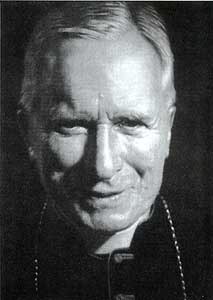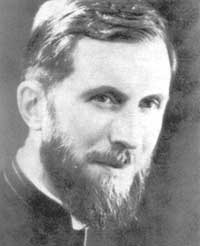Pastoral Letters: On Authority, Pt. 2
 |
The second part of a letter, begun last month (July 2001),
of Archbishop Lefebvre dealing with authority.
Written in Rome, February 5, 1968, to priests of the Holy Ghost Fathers.
Can it really be claimed that once he reaches adulthood man no longer needs help in acquiring further knowledge, remaining virtuous, and fulfilling his role in society? If the family has completed its essential task, it is clear that civil society and the Church remain the normal means to provide him, the one with the spiritual means, the other with a social milieu favorable to a virtuous life directed towards the final end to which all things on this earth are directed by Divine Providence.
At this point it is fitting to remind ourselves of the Church's traditional teaching, and that of all the Popes of the last century, that the State, civil society, has an important part to play in aiding and encouraging its citizens in faith and virtue. It is in no way a question of constraint in the act of faith, of constraint on a person's conscience in his internal and private acts. It is a matter of the natural role of civil society, willed by God, to help men obtain their last end.
"There can be no doubting," says Pope Leo XIII (in Libertas), "that the coming together of men in society is the work of God's will, whether it be considered in terms of its members, its form, which is authority, its cause, or the number and importance of the advantages which it procures for man."
Pius XII in his turn states that "God destined man to live in society, as nature requires. In the Creator's plan society is the natural means which man can and must use to attain his end" (Divini Redemptoris). And elsewhere (in Ad Salutem) he says, "princes and rulers having received power from God so that each, within the limits of his proper authority, may strive to realize the plans of Divine Providence, whose collaborators they thus are, must not only do nothing which may turn to the detriment of the laws of justice and Christian charity, but are bound to facilitate for their subjects the knowledge and acquisition of imperishable goods."
Pius XII (June 11, 1941) also says:
On the form given to society, on whether or not it conforms to the laws of God, depends, and from it flows, the good or ill of souls. That is to say, whether men, all called to be enlivened by the grace of Christ, should, as they pass through the earthly contingencies of this life, breathe the healthy and lifegiving air of truth and of the moral virtues, or, on the contrary, the unhealthy and often fatal germ of error and depravity.
Fr. Jolivet (Traité de Philosophie, Vol. IV, Morale, No. 435) draws a very definite conclusion from his study of the origins of power in civil society:
Whatever point of view one adopts concerning the efficient cause of the social reality, the doctrine of the natural origin of civil society implies this essential principle: that political society, permanently grouping individual groups of families and individuals with a view to the temporal common good, is an institution willed by God, the author of nature, or in other words, it exists by natural divine law. It greatly diminishes the general function of the state if one thinks of temporal happiness in purely materialistic terms. Temporal happiness depends in large part on the intellectual and moral virtues of the citizens, on public morality, that is on the happy flowering of all man's moral and spiritual activities, and, in the first place, on the religious life of the nation. This task has a negative and a positive aspect....
We must insist on the close bond between the temporal function of the state and religion, for in truth that bond holds the key to many of the problems which today preoccupy rulers and the Church herself: problems of social justice, problems of hunger and of peace, problems of the regulation of births, etc. To try to deal with these problems apart from a Catholic concept of the state is an illusion. One may briefly cover over some of the problems one takes on, or resolve some local difficulties, but humanity's ills will not be tackled at their roots. We must repeat over and over again what the Church has always proclaimed: the solution to these social problems lies in the Social Kingship of Our Lord Jesus Christ, as taught to us by the Gospels and the Magisterium of the Church. "Without me," says Our Lord, "you can do nothing" (Jn. 15:5).
List the social ills of our day and you will soon realize that they have their origin in ignorance or the denial of true social justice and of family and individual morality. And when that ignorance or denial finds expression in legislation, then the evil becomes permanent and on a national scale.
To seek to establish social justice between employers and employees without the principles of Christian justice is to head for totalitarian capitalism, which tends towards a world-wide financial and technocratic hegemony and totalitarian communism. To make material well-being the only aim of civil society and social activity leads rapidly to intellectual and moral decadence.
When it comes to marriage and everything connected with it, only Catholic doctrine truly preserves this institution, which is the very foundation of civil society, and so must be of the greatest concern to it. Divorce, limitation of families, contraception, homosexuality, polygamy—all these mortally wound the State. Only the Church provides the true remedies.
Relations in society between government and governed, between State and citizens, true love of country, and international relations are very closely dependent upon the conception of social morality. Only the Catholic religion provides the principles of justice, equity, professional conscience, and human dignity which conform to social life such as God has willed and always wills.
Education, and the means of social communication which today complete and continue it, are very closely bound up with good morals, with virtue and vice, and consequently with the true religion.
|
It shows great ignorance, or a pretence of ignorance, to refuse to recognize that all religions save the true one, the Catholic religion, bring with them a whole string of social defects which are the shame of humanity: in connection with the family, think of divorce, polygamy, contraception, unmarried couples living together, etc. With regard to the very existence of society, think of the tendencies that destroy it—a revolutionary tendency, destructive of authority; a demagogic tendency, continually fermenting disorder, the result of private judgment; or a totalitarian and tyrannical tendency, which makes the party or the person in power the basis of the law. The history of recent centuries is a striking illustration of this reality.
It is inconceivable, then, that Catholic governments should pay no heed to religion in the public domain. This would be to ignore the purpose of society, the extreme importance of religion in the social domain, and the fundamental difference between the true religion and the others in the moral field, which is an essential element for attaining the temporal end of the state.
This is the doctrine the Church has always taught. It confers on society a prime role in the citizens' practice of virtue, and so indirectly in their attaining eternal salvation. Now faith is the fundamental virtue, which affects all others. It is therefore the duty of Catholic governments to protect the faith, and to foster it especially by favoring it in the area of education.
It would be impossible to overemphasize the providential role of the authority of the state in aiding and supporting its citizens in attaining their eternal salvation. Every creature on earth was and remains created for this end. The societies of family, State, and Church, each in its own place, were created by God to this end. The history of Catholic nations cannot be denied: their conversion to the Catholic faith demonstrates the providential role of the State to the point that one must injustice say that its share in the eternal salvation of humanity is capital, if not supreme. Man is weak, and Christians waver. If the whole apparatus and social ethos of the State is secular, atheistic, areligious, and a fortiori if it persecutes the Church, who will dare say that it is easy for non-Catholics to convert and for Catholics to remain faithful. More than ever with modern means of social communication, and the multiplication of social relations, the State has a major influence on the behavior of its citizens, on their interior and outward lives, and consequently on their moral attitude, and, ultimately, on their eternal destiny. This is unfortunately true above all with regard to those who are weakest, intellectually, morally, and financially.
It would be criminal, then, to encourage Catholic states to become secularized, to pay no attention to religion, impartially to allow the spread of error and immorality, and, under the false pretext of human dignity, to introduce a ferment which would bring about the dissolution of society. Religious liberty raised to the status of public law in virtue of a so-called natural right, and the exaltation of the individual conscience to the point of legitimizing conscientious objection are clearly contrary to the common good. That is what the Church's traditional Magisterium has always taught as an unchangeable doctrine.
Pope Pius XII said (in Summi Pontificatus): "Civil sovereignty was willed by the Creator...to make it easier for the human person to obtain, in the temporal order, the physical, intellectual and moral perfection to help him attain his supernatural end." So whether with regard to authority in the family, that of the State, or that of the Church, one cannot but admire the design of Providence, of the Divine Fatherhood, which favors our existence, our supernatural life, the exercise of virtue and, ultimately, perfection, or holiness, by means of these authorities.
Authority is, in reality, a sharing in the Divine Love which runs over and spreads of its own accord. Authority exists for no other reason but to spread abroad that Divine Charity which is Life and Salvation. But of its very nature that charity is demanding: for Divine Love can only desire the Good, and the Supreme Good, who is God, in giving us Life, which is a sharing in His Love, inflexibly orientates that life for us and directs it towards the Good. He binds us by His love to the Good and to virtue. He shows us the orientation of His Love by His Laws. He commands us to obey them and threatens us if we refuse His Love which is our Good.
So it is with authorities. All legitimate legislation is a vehicle of Divine Love, and to put it into effect is nothing other than the expression of Divine Love in action, and so is to acquire virtue. These laws are directed at our intelligence and our will, which, alas, can refuse to be vehicles of the Love of God. Such refusals will bring down punishment upon those who thus place obstacles in the way of Love, Life, the Good, and, ultimately, of God. One cannot conceive of authority without the three powers of legislation, government, and justice. These three manifestations have their synthesis in the Divine Love, which carries in itself its manifestation, its exercise, and its sanction.
I would like to conclude this very incomplete survey of the greatness of authority in the divine plan by making my own the words of St. Paul: "I bow my knees to the Father of our Lord Jesus Christ, of whom all paternity in heaven and earth is named" (Eph.3:14-15).

